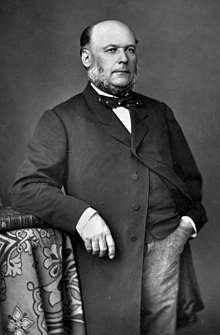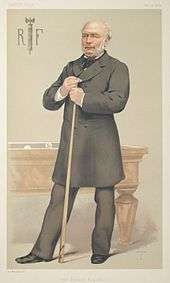Jules Grévy
François Paul Jules Grévy (French pronunciation: [ʒyl ɡʁevi]; 15 August 1807 – 9 September 1891) was President of France from 1879 to 1887, and one of the leaders of the Opportunist Republican faction. Given that his predecessors were monarchists who tried without success to restore the French monarchy, Grévy is seen as the first real republican President of France.[1][2]
Jules Grévy | |
|---|---|
 | |
| President of France | |
| In office 30 January 1879 – 2 December 1887 | |
| Prime Minister | Jules Armand Dufaure William Henry Waddington Charles de Freycinet Jules Ferry Léon Gambetta Charles de Freycinet Charles Duclerc Armand Fallières Jules Ferry Henri Brisson Charles de Freycinet René Goblet Maurice Rouvier |
| Preceded by | Patrice de MacMahon |
| Succeeded by | Marie François Sadi Carnot |
| Personal details | |
| Born | 15 August 1807 Mont-sous-Vaudrey, France |
| Died | 9 September 1891 (aged 84) Mont-sous-Vaudrey, France |
| Political party | Moderate Republican |
| Alma mater | University of Paris |
Biography
Born at Mont-sous-Vaudrey in the Jura Mountains, he became an advocate in 1837 distinguishing himself at the Conférence du barreau de Paris, and, having steadily maintained republican principles under the Orléans monarchy, was elected by his native department to the Constituent Assembly of 1848. Foreseeing that Louis Bonaparte would be elected president by the people, he proposed to vest the chief authority in a president of the Council elected and removable by the Assembly, or in other words, to suppress the Presidency of the Republic. After the coup d'état this proposition gained Grévy a reputation for sagacity, and upon his return to public life in 1868 he took a prominent place in the Republican party.

Initiated at "La Constante Amitié" in Arras,[3] his Masonic activity is inseparable from his political action,[4] specially in the struggle for separation of Church and State that marked the beginning of the Third Republic and MacMahon resignation.
After the fall of the Empire he was chosen president of the Assembly on 16 February 1871, and occupied this position until 2 April 1873, when he resigned on account of the opposition of the Right, which blamed him for having called one of its members to order in the session of the previous day. On 8 March 1876 he was elected president of the Chamber of Deputies, a post which he filled with such efficiency that upon the resignation of Marshal MacMahon he seemed to step naturally into the Presidency of the Republic (30 January 1879), and was elected without opposition by the republican parties.[5]
Resignation
Quiet, shrewd, attentive to the public interest and his own, but without any particular distinction, he would have left an unblemished reputation if he had not accepted a second term (18 December 1885). Shortly afterwards, his son-in-law, Daniel Wilson, was found to be trafficking in the awards of the Legion of Honour. Grévy was not accused of personal participation in these scandals, but he was somewhat obstinate in refusing to realize that he was indirectly responsible for the misuse his relative had made of access to the Elysée, and it had to be unpleasantly impressed upon him that his resignation was inevitable (2 December 1887).[6] This political matter was the first one to feed the anti-masonic opinion in France.[7]
Death and legacy
He died at his home at Mont-sous-Vaudrey on 9 September 1891, following pulmonary edema. The state funeral was held on 14 September.
In private life, Grévy was an ardent billiards player, and was featured in a portrait as a player in Vanity Fair magazine in 1879.
Grévy's zebra is named after him.
Caricature
In 1882, a caricaturist represented Jules Grévy as a royal sphinx and an Egyptologist produced a hieroglyphic titulature presenting him as a pharaoh "who repels the Khroumirs", in allusion to the conquest of Tunisia which took place in 1881.[8]
See also
- Listing of the works of Alexandre Falguière
- List of works by Eugène Guillaume
References and notes
Discours politiques et judiciaires, rapports et messages accompagnes de notices historiques et l'ricédis d'une introduction par L. Delabrousse (2 vols., 1888)

- "François Paul Jules Grévy is Born". Masonry Today. 2017.
- "Jules Grevy". World presidents DB. 2017.
- Dictionnaire de la Franc-Maçonnerie (Daniel Ligou, Presses Universitaires de France, 2006)
- Dictionnaire universelle de la Franc-Maçonnerie (Marc de Jode, Monique Cara and Jean-Marc Cara, ed. Larousse , 2011)
- "Jules, François, Paul Grévy". Assemblée nationale. 2017.
- Rochefort, Henri. "The Adventures of My Life, vol. 2" pp315-318
- Dictionnaire universelle de la Franc-Maçonnerie (Marc de Jode, Monique Cara and Jean-Marc Cara, ed. Larousse, 2011)
- Frédéric Colin, « Le pharaon Jules Grévy à Bibracte et la campagne de Tunisie contre les Khroumirs », Carnet de laboratoire en archéologie égyptienne, 10 Augustus 2020, https://clae.hypotheses.org/487, accessed 15 Augustus 2020
| Political offices | ||
|---|---|---|
| Preceded by Patrice de MacMahon |
President of France 1879–1887 |
Succeeded by Sadi Carnot |